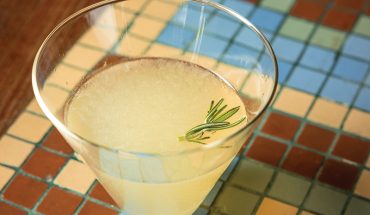Heirloom Brewshop makes thoughtful choices
by Iza Wojciechowska | photography by Smith Hardy

When husband and wife team Chuan Tsay and Anna Phommavong opened Heirloom last October, it was a culmination of a year’s-long dream for the couple. But it was also more than that: For them, opening a coffee shop was the perfect way to honor their Asian heritage and their families.
Heirloom offers coffee, tea, sake cocktails and small plates in a serene setting in Raleigh’s Warehouse District. Inside, the atmosphere is cozy yet cool: A sloping wooden-slatted structure softens the industrial ceiling, and pastel-pink chairs warm the minimalist space. But despite being on-trend, nothing at Heirloom is arbitrary. Tsay, 32, and Phommavong, 29, have made sure that every dish, cocktail and design detail means something, is inspired by tradition and also speaks to them—and by extension, they hope, to their guests.

Both of their parents were immigrants, Tsay’s from Taiwan and Phommavong’s from Laos. Both families opened restaurants in the U.S., labeling their food as Chinese, and serving it alongside subs and pizza so that it would be recognizable and palatable to Americans. Tsay says that growing up in the hospitality industry as an Asian-American was painful: He watched his parents struggle to navigate a new culture while having to erase part of their own, and recalls several instances when he and his parents were victims of race-based violence.
And yet, though Tsay and Phommavong first worked as digital and interior designers, both felt an undeniable pull toward running their own restaurant. Their parents discouraged them—they were worried they’d face the same discrimination—but they persevered. “We wanted to do something to carry on what our parents taught us and to have something that we could leave behind as well,” Tsay says. “This is how we pay respect to them.” For this new generation of Asian-American restaurateurs, Heirloom is a way to honor their parents’ hard work and follow in their footsteps, too.

With thoughtful detail, every item on the menu is rooted in heritage and carefully brought to life. The Sokdy (a sake cocktail with flavors of coconut, pineapple, ginger and basil) incorporates traditional Laotian flavors and honors Phommavong’s grandmother; Sokdy was the name of her business in Laos, and also means “good luck.” Sparkling mint cold brew, Taiwanese fried chicken, mini pineapple cakes and a red tea-sake cocktail all sound hip and tasty—but are actually based on the Asian street foods, rituals and flavors that Tsay and Phommavong grew up with in their homes.
The decor has meaning, too. There are nods to Tsay’s father, who passed away just a month before Heirloom opened. As a chef, he would always collect equipment and had an extensive assortment of timers. Whenever Tsay would visit, his dad would give him one, so soon he too had a collection that he thought he would never use; but today, Tsay puts the timers to use at Heirloom when cooking or brewing tea.
The bright and airy space is thanks to floor-to-ceiling windows, and the counter—topped with a pastel pink espresso machine—is intentionally lower than a normal space, allowing guests to peer behind the bar, fostering their sense of community and togetherness. “In the ceiling: the smallest part is a simple slat of wood, but those parts come together to create a whole that is stronger and more complex than any single piece,” Tsay says. “That’s our philosophy on people: that as humans, we’re simple beings, but when we come together as a whole and as a community, that’s when we take on form, become stronger and more complex.”

Today, Heirloom bustles with people working on laptops while sipping a five-spice latte during the day or coming in for a drink on first dates (sometimes several first dates, Phommavong notes), all appreciating the cuisine, cocktails and culture that Tsay and Phommavong so thoughtfully crafted. And that reflects the team’s ethos: Tsay and Phommavong say they want their shop to serve as a positive, meaningful space for locals to connect with each other and then carry those feelings into the world.
Already, it seems, the community has risen to the occasion. The couple was surprised—and happy—to find themselves embraced by their neighbors, in striking contrast to the hardships their parents faced. “When we first opened, guests would come in and welcome us to the neighborhood,” Phommavong says. “I just never expected that. We wanted to welcome them, but they welcomed us instead.”



